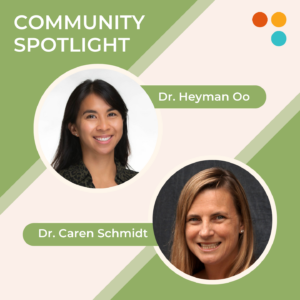Community Spotlight: Heyman Oo and Caren Schmidt, Marin Community Clinics

Heyman Oo, MD, MPH, a pediatrician, is the Associate Medical Director at Marin Community Clinics (MCC). Caren Schmidt, PsyD, is MCC’s Associate Director of Behavioral Health. For the past six years, they have championed trauma-informed care and ACE screening and intervention at their clinic. Their work is a featured case study in the ACEs Aware ACE Screening Implementation How-To Guide, in which they described their experiences obtaining buy-in for piloting and designing the implementation process for organization-wide ACE screening, training staff on trauma-informed care, and expanding internal and external resources to respond to ACEs and toxic stress.
Learn more when Drs. Oo and Schmidt present at the June 22 ACEs Aware “Implementation with Intention” webinar (registration and more information).
You began implementing ACE screening as a pilot in 2017. How did engaging in this work impact your clinic’s response to the COVID-19 pandemic in 2020?
When we began our work on ACE screening and response, we were not fully aware of how transformative it would be for our clinic’s culture and resilience. As part of one of our grants, we started with an all-staff training on trauma-informed care, which helped to build a foundation of shared understanding and a common language with which to speak about trauma. It destigmatized the topic, and staff members from all levels, from front office to billing to nursing, were able to reflect on their own histories, or the histories of their loved ones, in a different way. Then, when the COVID pandemic started in 2020, we realized quickly that we were all experiencing a collective trauma together. As a health care system, our staff were dealing with an enormous amount of uncertainty, stress, and fear. Because we were able to recognize that, we could break the taboo, talk about it, and even take steps to process it together. We held monthly meetings for all staff that covered topics like how to give your colleagues grace and how to grapple with grief knowing that everyone processes their experiences in a different way, but that we were doing it together.
Additionally, the COVID pandemic had the unintended effect of destigmatizing trauma. It was easy, in fact essential, for our staff to talk about COVID and the effects of the pandemic on our patients’ lives. This opened the door to be able to extend the conversation to other traumas people may have experienced in their past, something that originally many of our staff were hesitant to address directly. Experiencing this collective trauma not only deepened everyone’s understanding of trauma and its effects, but also opened the conversation and made screening a natural part of our patient conversations.
How have you seen this field change over time, and how has your view of this work changed over time?
When we started this work, a lot of the conversation centered around, “How can we implement another screener into the clinical visit without burning out our providers and care teams that already have too much to do?” Slowly though, the conversation has shifted to, “How can we provide better trauma-informed care, and where does ACE screening fit into that model?”, just like the discussion about how domestic violence screening and postpartum depression screening fit in that model. Anyone who has done this work for a while knows that the work is so much more than a score on a screener; it is a tool for building trust and deepening the relationship that a provider or clinic has with their patients. You cannot screen in a way that is divorced from the real human interaction that promotes healing, but when you invest in the trauma-informed care model, everything you do changes.
In what ways do you think the new Medi-Cal funding opportunities, such as dyadic services benefit, community health worker reimbursement, and California Advancing and Innovating Medi-Cal (CalAIM) case management and housing support, can bolster clinics and communities in their ACE screening and trauma-informed care work?
It is amazing, and well past time, that payors support these types of services. While technology has been helpful in many ways to reduce barriers and streamline some processes, the truth is that many patients are still unable to benefit from these “technologic advances”. With this type of work, in particular, the time-intensive one-on-one relationships that help build trust and support patients are absolutely necessary for a successful response to a positive ACE or other trauma screen. You cannot shortcut your way to healing, and a good case manager is worth their weight in gold.
The new funding sources will also make it possible to move from responding to trauma and its effects to preventing trauma in the first place. With both the dyadic services and expanded case management service, we will be able to intervene with support before there is a crisis and help strengthen our patients and families.
What would you suggest to clinics that are either just starting to implement ACE screening and response or are concerned they don’t have the bandwidth to do it?
We would say that focusing on trauma-informed care and really understanding why ACE screening is important to you and your clinic is critical. The bandwidth is there because the clinic is having to deal with and manage the outcomes of ACEs one way or another, but if you could address these issues in a more upstream way, or if you could build a better foundation of trust with your patient, it truly does not feel so overwhelming. Also, start small, do a few pilots, and listen to the feedback you hear from your frontline staff because they are best positioned to know what will or will not be successful.